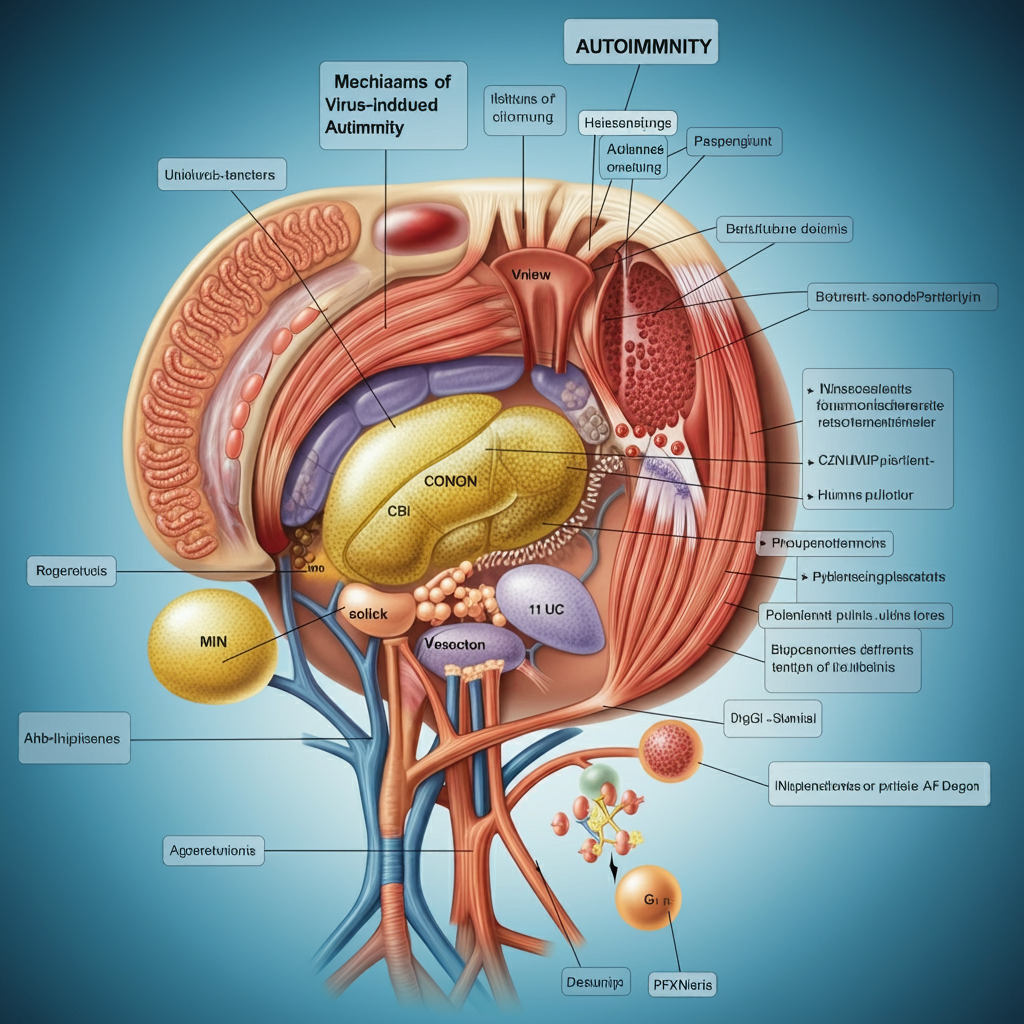TL;DR:
- Autoimmune diseases arise when the immune system attacks body tissues due to a mix of genetic and environmental factors.
- Viruses, through mechanisms like molecular mimicry, can trigger autoimmune diseases.
- Key viruses linked to autoimmune conditions include:
- Epstein-Barr Virus: Associated with MS and lupus.
- Hepatitis C Virus: Linked to mixed cryoglobulinemia and autoimmune hepatitis.
- Cytomegalovirus: Impacts immune response.
- Herpes Simplex Virus: Can trigger autoimmune inflammation.
- Common symptoms: fatigue, joint pain, skin rashes, inflammation.
- Current research focuses on prevention via vaccines and understanding genetic predispositions.
Ever wondered if a virus could flip the script on your immune system and turn it against you? In this article, we will answer the question, can virus cause autoimmune disease? That’s right—certain viruses might play a sneaky role in triggering autoimmune diseases, where your immune system mistakenly attacks your body’s tissues. We’re diving deep into the fascinating yet perplexing links between viruses and autoimmune conditions like lupus and multiple sclerosis. We’ll discuss which viruses have been put on the suspect list and explore how they might pull the strings in this complex health mystery. Buckle up for an eye-opening journey into the curious world of viruses and autoimmunity!
Understanding Autoimmune Diseases and Viral Links
Autoimmune diseases occur when your immune system, which should guard your body, mistakenly attacks your tissues. Think of it like a security alarm mistaking friends for intruders. This can lead to chronic inflammation and damage to various parts of your body. Although complex, these diseases are believed to result from a mix of genetic and environmental factors.
Can Viruses Trigger Autoimmune Diseases?
Yes, viruses can indeed trigger autoimmune diseases by disrupting normal immune function. They sometimes mimic body cells, confusing your immune system into attacking your own tissues. It’s like a virus dressing up like your cells, tricking the immune system into launching a self-directed assault.
Here are some viruses linked to autoimmune conditions:
- Epstein-Barr Virus: Associated with multiple sclerosis and systemic lupus erythematosus.
- Hepatitis C Virus: Linked with mixed cryoglobulinemia and autoimmune hepatitis.
- Cytomegalovirus: Implicated in various autoimmune diseases.
- Human T-lymphotropic Virus Type 1 (HTLV-1): Related to HTLV-1-associated myelopathy.
- Herpes Simplex Virus: Has potential effects on autoimmune diseases.
These viruses play vital roles in triggering or worsening autoimmune responses, making them important players in understanding these diseases.
Mechanisms of Virus-Induced Autoimmunity
Viruses can indeed spark autoimmune diseases, mainly through a mechanism called molecular mimicry. This occurs when viral proteins resemble your body’s proteins. The immune system then mistakenly attacks its own cells, thinking they are viruses. It’s like playing “guess who” and making the wrong guess.
Additionally, viruses may cause chronic inflammation and directly infect immune cells, leading to inappropriate immune responses. Imagine a persistent fire alarm that eventually causes overreactions. These problems can be severe for those genetically prone to autoimmune diseases, making viral infections risky.
|Mechanism|Description|
|—|—|
|Molecular Mimicry|Viral proteins resemble host proteins, causing mistaken immune attacks.|
|Chronic Inflammation|Persistent inflammation disrupts normal immune functions.|
|Direct Infection of Immune Cells|Viruses invade immune cells, causing misdirected responses.|
Understanding these mechanisms is crucial to preventing and treating virus-induced autoimmune diseases. It’s like piecing together a puzzle where every bit is essential.
Specific Viruses Linked to Autoimmune Conditions
Epstein-Barr Virus
Epstein-Barr Virus (EBV) is linked to autoimmune diseases like multiple sclerosis (MS) and systemic lupus erythematosus (SLE). Research shows those with EBV have a higher risk of developing these conditions. EBV is common—almost 90% of the population carries it quietly. However, in some, it may spark an immune response that leads to MS or lupus.
Hepatitis C Virus
Hepatitis C is known for its link to mixed cryoglobulinemia and autoimmune hepatitis. This virus can cause the production of abnormal proteins called cryoglobulins, which accumulate and cause inflammation. Autoimmune hepatitis results when the immune system mistakenly attacks the liver.
Cytomegalovirus
Cytomegalovirus (CMV) often lurks without symptoms but can affect the immune system. It’s like a puppet master, disrupting immune responses and possibly triggering autoimmune conditions in predisposed individuals.
Herpes Simplex Virus
Herpes Simplex Virus (HSV) is known for causing cold sores or genital herpes. It might also influence autoimmune diseases by triggering overactive immune responses, leading to inflammation and tissue damage.
Symptoms and Outcomes of Virus-Induced Autoimmune Diseases
Symptoms can be diverse but commonly include fatigue, joint pain, and skin rashes. They arise when the immune system attacks your tissues, causing inflammation.
Outcomes can vary, especially in those genetically predisposed. A viral infection might ignite a predisposed autoimmune condition, leading to severe, long-term issues needing continuous management.
- Fatigue
- Joint pain
- Skin rashes
- Organ-specific symptoms
- Inflammation
Understanding these symptoms and outcomes helps manage and mitigate risks associated with these diseases.
Current Research and Potential Treatments
Research is key to understanding how viral infections could trigger autoimmune diseases. Scientists are studying genetic predispositions and environmental factors to prevent these diseases.
Vaccines are a primary focus for prevention. They train your immune system to fight viruses before harm occurs. Furthermore, exploring lifestyle and environmental factors like diet and toxins might reduce autoimmune disease risks.
Direct primary care offers personalized, comprehensive healthcare, especially for complex autoimmune conditions. It allows doctors more time with patients to tailor treatment plans effectively, providing promising ongoing care solutions.
By understanding mechanisms and current research, we can build better prevention and treatment strategies, ensuring a robust defence against virus-induced autoimmune diseases.
Final Words
Exploring how viruses can cause autoimmune disease gives us a peek into the body’s complex workings. Viruses like Epstein-Barr and hepatitis C might trigger these diseases by mimicking our own cells, confusing the immune system. It’s kind of like getting caught up in a case of mistaken identity!
Understanding these viral links opens the door to new treatments and prevention strategies. Ongoing research is crucial, perhaps paving the way for more tailored therapies.
Staying informed helps us tackle these challenges with optimism and curiosity, aiming for better health outcomes.
FAQ
Can viruses trigger autoimmune diseases?
Viruses can trigger autoimmune diseases by disrupting normal immune function. Some viruses, like Epstein-Barr and hepatitis C, are linked to conditions like multiple sclerosis and lupus.
What infections cause autoimmune diseases?
Certain infections, such as those caused by Epstein-Barr virus, hepatitis C, cytomegalovirus, HTLV-1, and herpes simplex virus, have been linked to autoimmune diseases.
Can COVID trigger autoimmune diseases?
COVID-19 can trigger autoimmune diseases in some cases. It may alter immune regulation or cause chronic inflammation, which contributes to autoimmune responses.
Why do I suddenly have an autoimmune disease?
The sudden onset of an autoimmune disease can occur due to factors like viral infections or genetic predisposition. For an accurate diagnosis, it’s best to consult a healthcare professional.
Can autoimmune disease be transmitted sexually?
Autoimmune diseases are not sexually transmitted. They result from the immune system mistakenly attacking the body’s own tissues.
Can autoimmune disease kill you?
Autoimmune diseases can be serious and may lead to life-threatening complications if not managed. Effective treatments can often help control disease progression.
Is AIDS an autoimmune disease?
AIDS is not an autoimmune disease. It is caused by HIV, which weakens the immune system, making the body more susceptible to infections.
Do I have an autoimmune disease quiz?
While online quizzes exist, they’re not a substitute for a medical evaluation. If you suspect an autoimmune condition, seek advice from a healthcare professional.
What is the number one cause of autoimmune disease?
There isn’t a single cause for autoimmune diseases. They result from a combination of factors, including genetic predisposition and environmental triggers like viral infections.

